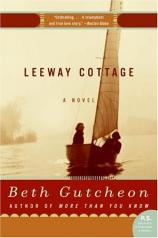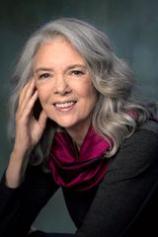Leeway Cottage
Review
Leeway Cottage
I just came back from a few days in Maine, so to read a novel like this one, which affectionately recalls the state's wild, spare beauty and unsentimental character, is a pleasure. The "cottage" of the title is actually a substantial house --- "a big, airy ramshackle cross between a castle and a barn" --- that serves as the setting for Beth Gutcheon's family saga. Its occupants are summer people, city-dwellers for whom the yearly escape to the coastal village of Dundee is like a breath of freedom. But it's no guarantee of happiness: The book's emotional focus is on two impaired relationships --- one between mother and daughter, the other between man and wife.
The wife and daughter are the same woman. Born Annabelle Brant, she rebels against her vain, controlling mother, Candace --- changing her name to Sydney, moving to New York City, and studying voice instead of taking "a lovely finishing year in Florence." But after marrying Laurus Moss, a Danish pianist, nest-building takes over; in time, unconsciously she turns into a clone of her mother: conventional, moody, difficult to please. Sydney's vulnerability makes her a character you root for, at least at first; in a chilling REBECCA-esque sequence, Candace shows up at a debutante ball wearing the same dress as her daughter. But there is a curiously choppy, ungrounded quality to her story. Although it spans many years, it never builds up emotional steam or gives me the sense of being really lived-in. The many details --- dress, food, conversation --- ought to help, but they clutter the narrative rather than give it muscle.
Gutcheon does better with her parallel tale, set in Denmark among Laurus's friends and family as Hitler occupies the country and its people begin to resist. In fact, LEEWAY COTTAGE is somewhat more interesting as history than as fiction. It highlights the way Denmark protected and rescued nearly all of its 7,000 Jews, paying tribute to quiet, decent people torn from comfortable lives and forced into danger. The book gives us nail-biting escape attempts, both tragically thwarted and exhilaratingly successful, and a grim concentration-camp episode involving Laurus's sister, Nina, a partisan. Laurus himself, meanwhile, has left a pregnant Sydney in New York and gone to London to work for the resistance from afar (he is too well-known a musician to operate undercover in Denmark). Even here, though, despite a suspenseful plot, the scenes often have the feeling of set-pieces worked up from careful research, not born in the heart.
And as if juggling these multiple stories and continents weren't complicated enough, Gutcheon has set herself another task in LEEWAY COTTAGE: "I wanted to examine a certain kind of 20th century American marriage," she said in an interview, "in which the husband and wife, as they have grown and as life has changed them, appear by mid-life to be so different as people that…their own children can't understand how they chose each other in the first place." It doesn't help, of course, that Sydney and Laurus are separated for the four years he's in Europe, so she never understands what the war meant to him and his family. He, on the other hand, is unable to heal the loneliness and rage that have crippled his wife almost from childhood. And yet they stay together, as ill-matched couples in that generation did.
I think my grandmother and grandfather were like that: She liked the city and he gravitated toward the countryside, so he lived on a farm and she spent weekdays in an apartment. They bickered; yet there was an abiding affection, too. He certainly had affairs; she had flirtations. They remained married, though possibly --- probably --- they would have been happier apart.
Although I believe Gutcheon is onto something true and important, she isn't able to get deep inside the marital relationship, its subtle comforts, frustrations, and deceptions. She clearly is trying not to overanalyze: to "show, not tell," as fiction workshops instruct. But the lack of intelligent introspection makes the story seem rushed and sketchy. Before I knew it, Sydney and Laurus were middle-aged, then elderly, with Sydney suffering from what seems to be Alzheimer's and the couple depending more and more on their (not very memorably characterized) adult children.
It's a lot for one book: the chronicle of war, the summer-place story, the portrait of a marriage. There also is a cryptic philosophical undercurrent having to do with Laurus's favorite metaphor for death: "In heaven," one of his daughters explains, "you get to see the movie of your life, with all the mysteries explained. You get to see all the scenes you missed and the parts you never understood." And after that? "You're content," Laurus says. "You can be done with life and go on." Laurus is a lovely, soulful character, but the volley of "surprise" twists launched at book's end --- ostensibly to fill in the blanks of his life --- seemed to me neither electrifying nor enlightening. It's one trick too many.
It was no punishment to spend time with LEEWAY COTTAGE's engaging people. I preferred the Danish chapters, because through them I glimpsed a lesser-known side of World War II. But in the last analysis, the book never gave me entrée to a rich, three-dimensional alternate world, which is the whole reason I read fiction.
The cottage itself, though, sounds dreamy. I'd go there for a summer anytime.
Reviewed by Kathy Weissman on January 11, 2011
Leeway Cottage
- Publication Date: May 1, 2006
- Genres: Fiction
- Paperback: 448 pages
- Publisher: Harper Perennial
- ISBN-10: 0060539062
- ISBN-13: 9780060539061










